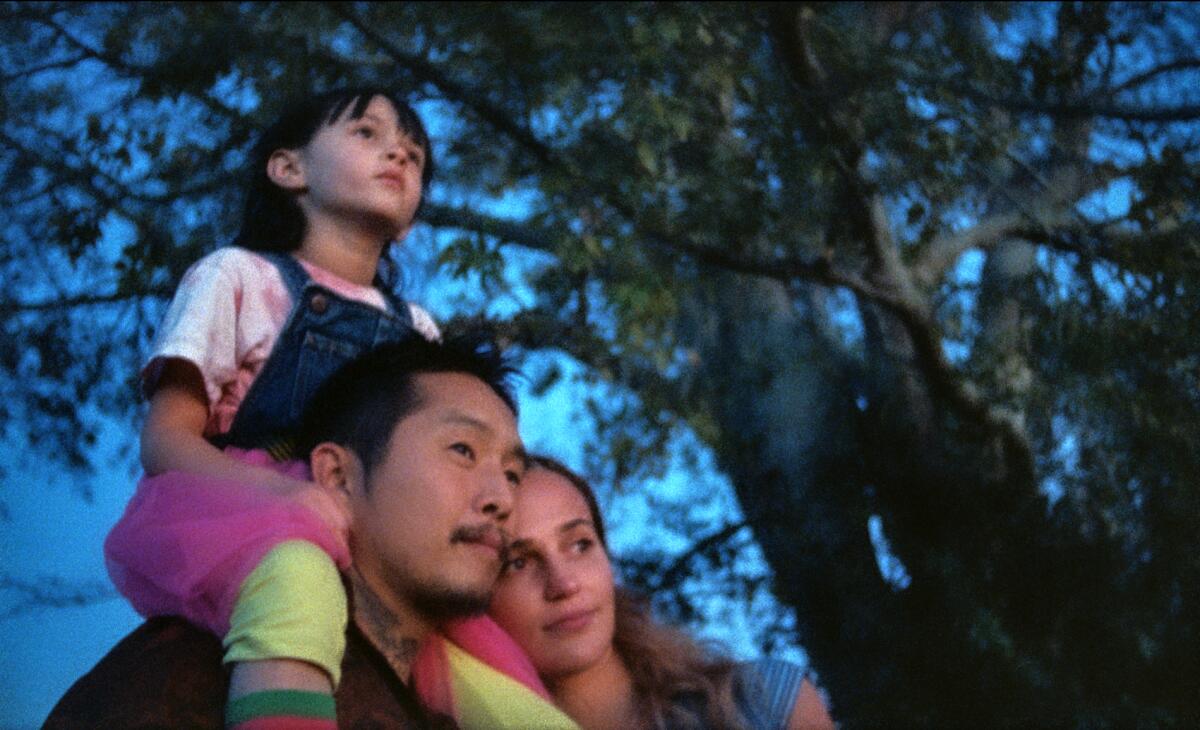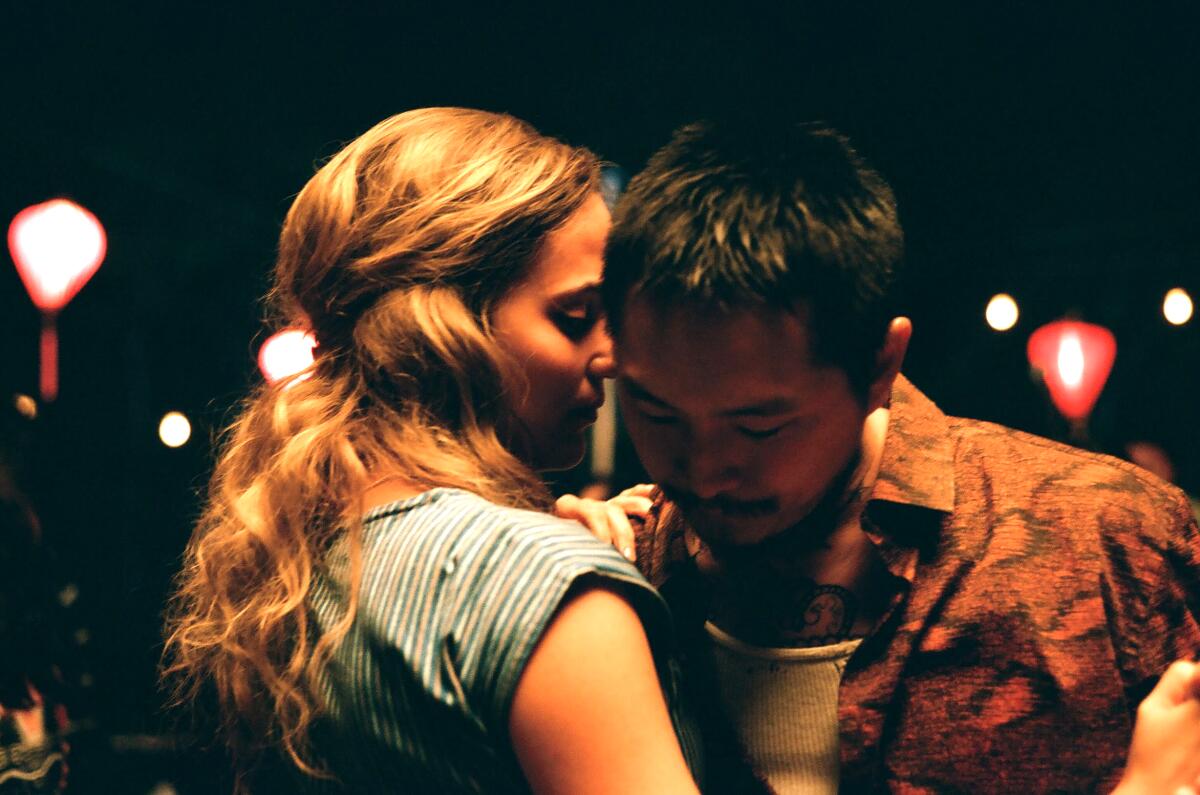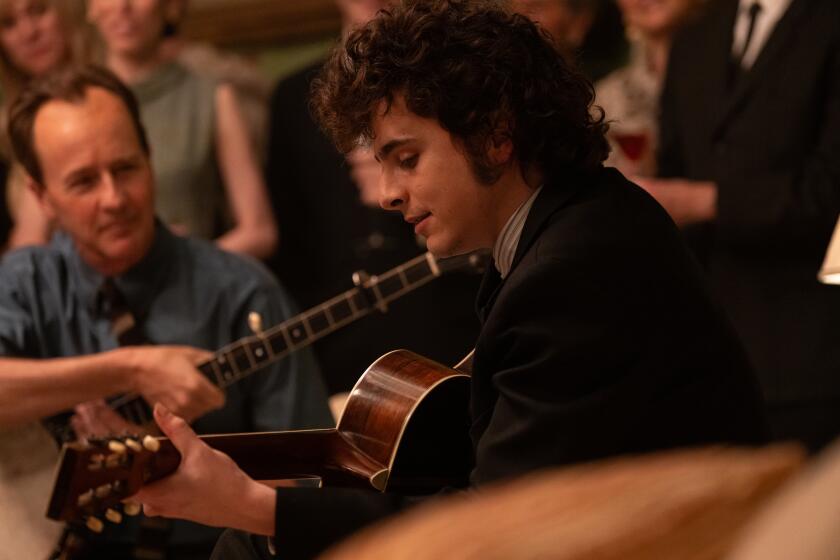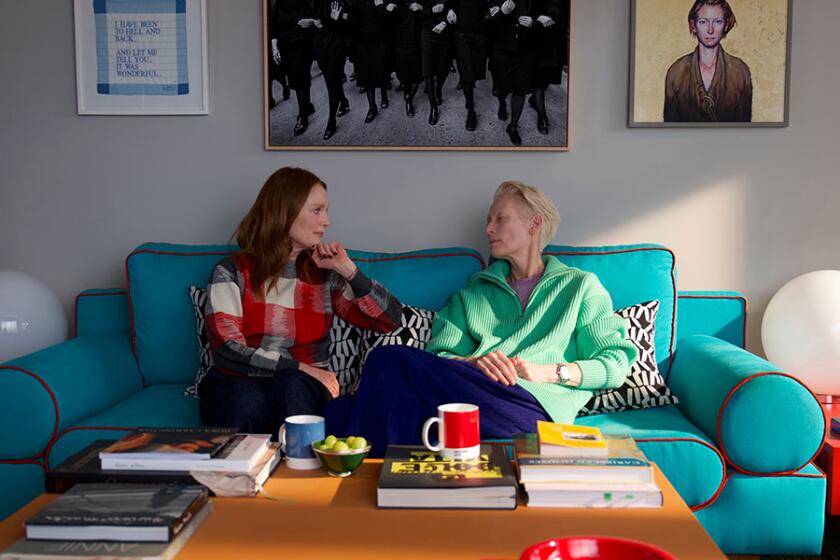Review: Tempestuous ‘Blue Bayou’ lays bare a Korean American immigrant’s nightmare

- Share via
The Times is committed to reviewing theatrical film releases during the COVID-19 pandemic. Because moviegoing carries risks during this time, we remind readers to follow health and safety guidelines as outlined by the Centers for Disease Control and Prevention and local health officials.
It rains often and without warning in “Blue Bayou,” a very messy, very moving tempest of a movie. Part of this has to do with the fact that it’s set in Louisiana, with its frequently unpredictable and inclement weather. But it also has something to do with the melodramatic inclinations of the writer, director and star, Justin Chon, who isn’t afraid to unleash a torrential downpour when his characters are at their lowest ebb. When Antonio Leblanc (Chon) is arrested and thrown in jail by a bullying cop — a banal stroke of bad luck that will have devastating unforeseen consequences for his family — the skies open with almost biblical intensity, as if God himself were weeping for one of his lost children.
If that sounds a little overripe, it’s in keeping with the movie, and I say that with more admiration than disdain. Artfulness and restraint can be admirable qualities in a filmmaker, but rage and despair, when channeled with this much force and purpose, can be undeniably effective substitutes. Moving east from the Los Angeles Korean American enclaves of his previous two features, “Gook” and “Ms. Purple,” Chon situates “Blue Bayou” in an emotional register as lush and overheated as its subtropical milieu. He proceeds on the logic that Antonio’s story — one of hard-won happiness derailed by bureaucratic indifference, deep-seated racism and garden-variety malice — does not exactly cry out for subtlety.
Antonio is an underemployed New Orleans tattoo artist, a happy husband to Kathy (Alicia Vikander) and an adoring stepfather to their 7-year-old daughter, Jessie (Sydney Kowalske). He’s also a Korean American adoptee — a detail that becomes crushingly relevant when he runs afoul of Jessie’s biological dad, Ace (Mark O’Brien), who’s long been absent from her life and now wants back in. Arrested after an ugly supermarket scuffle, Antonio is turned over to U.S. Immigration and Customs Enforcement and suddenly faces deportation to a country he hasn’t seen since he was 3. As a none-too-optimistic immigration lawyer (Vondie Curtis-Hall) explains, Antonio’s plight is not an uncommon one for many who were adopted from overseas decades earlier — victims of improperly filed citizenship papers and a newly emboldened ICE. Antonio’s record, which includes criminal charges for motorcycle theft, doesn’t help his case.
The real-life underpinnings give Antonio’s experience a measure of topical force, even if Chon complicates the narrative — and to some degree undermines it — with the kinds of contrivances that tend to surface more often in screenplays than in real life. With Antonio having already made an enemy of a cop and his boorishly racist partner (Emory Cohen), the script balances the equation by giving him a tattoo-parlor customer (Chris Bosarge) who happens to be a sympathetic ICE agent. The intended suggestion seems to be that destructive policy decisions are the fault of institutions, not individuals — an attempt at equanimity that nonetheless blunts the edge of an otherwise admirably, unswervingly political drama.

Elsewhere, Antonio strikes up a moving friendship with another customer, Parker (a terrific Linh-Dan Pham), whose harrowing account of her childhood journey from Saigon sheds light on another fraught dimension of the Asian immigrant experience. But here, too, the movie drowns the poignancy of her account with a series of choices — a cancer diagnosis, a faux-lyrical monologue — that bleed into Antonio’s story as well; his own traumatic memories of his early life in Korea are unleashed in a whirlwind of visual kitsch. But if Chon’s script and direction might have benefited from a touch more discipline, he nonetheless steers his actors (himself included) with an assured touch, aided by the rough-hewn fluidity of Reynolds Barney’s editing and Ante Cheng and Matthew Chuang’s camerawork.
Vikander, often acclaimed for roles that call for elegance and poise, has rarely been this forceful and immediate on-screen, and she and Chon achieve a portrait of a marriage that pulses with warmth, life and a ferocious mutual need. Chon, nicely approximating a Cajun accent, slips effortlessly into the inked, muscled frame of a man who’s had to toughen himself against a brutally unfair system. There’s no self-pity in that characterization; Antonio would prefer that his traumas stay private. But as his fateful day in court approaches, he undertakes a reluctant, bruising journey into the past in which long-buried memories — neglectful foster homes, abusive guardians — come painfully to light.
“I chose you,” Antonio reassures his stepdaughter early on, when she raises doubts about whether he’ll ever love her as much as the child that he and Kathy are expecting (another twist of the melodramatic knife). His words, especially bittersweet coming from someone with so few choices in his own difficult upbringing, are an assertion of love as conscious choice, one that echoes the language adopted children may sometimes hear from their parents. It also evokes the determination, the self-will, of countless immigrants who have chosen to make and call America their home.
You’re meant to reflect on their experiences. You might also find yourself thinking of the migrant families traumatized and separated at the U.S.-Mexico border in recent years — a different dimension of the immigrant crisis that nonetheless resonates with this movie’s singular nightmare. It’s in Antonio’s love for his wife and children, and his fear of losing them, that “Blue Bayou” finds a core of wrenching emotional honesty that survives its more manipulative impulses. It knows the love it takes to build and nurture a family, and the violence it takes to tear that family asunder.
‘Blue Bayou’
Rated: R, for language throughout and some violence
Running time: 1 hour, 57 minutes
Playing: Starts Sept. 17 in general release
More to Read
Only good movies
Get the Indie Focus newsletter, Mark Olsen's weekly guide to the world of cinema.
You may occasionally receive promotional content from the Los Angeles Times.











